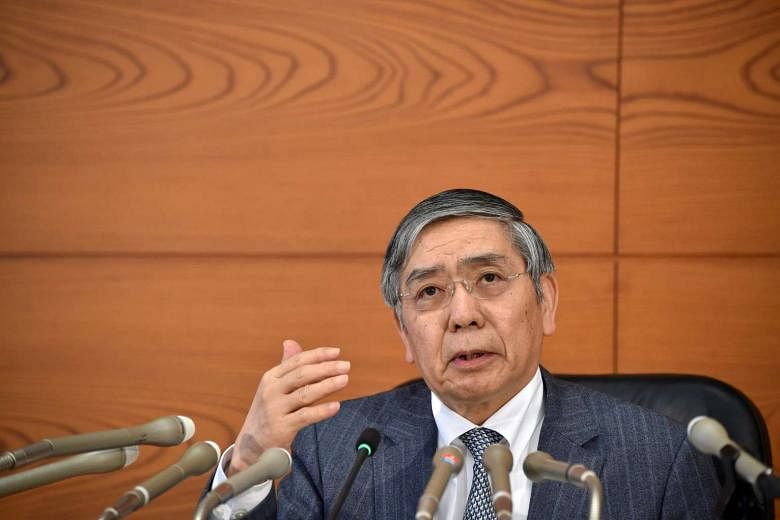NEW YORK (REUTERS) - Bank of Japan Governor Haruhiko Kuroda said the central bank was ready to expand monetary stimulus again if recent weaknesses in inflation expectations persist, stressing that there are "many ways" to do so to achieve his ambitious price target.
Mr Kuroda also dismissed the view the central bank's decision in January to adopt negative interest rates was directly aimed at weakening the yen to give Japan's exports a trade advantage.
"I can clearly say that our monetary policy ... isn't targeted at exchange rates," he said on Wednesday (April 13)at a seminar hosted by Columbia University.
Mr Kuroda made the remarks ahead of a meeting of Group of 20 financial leaders in Washington this week, where currency policy is seen high on the agenda in the face of subdued global growth.
While maintaining his optimistic view of Japan's economic outlook, Mr Kuroda acknowledged that inflation expectations - key to the success of his massive monetary stimulus programme - have been weakening in recent months. "If there is any risk of declining inflation expectations affecting achievement of our price target ... we won't hesitate to further ease monetary conditions," he said, signalling the BOJ's readiness to ease again as early as this month.
The BOJ stunned markets in January by deciding to add negative interest rates to its massive asset-buying programme in a fresh attempt to achieve its 2 per cent inflation target.
But the move has failed to arrest an unwelcome yen rise that hurts already weak exports and an economy skirting recession.
Japanese business sentiment soured to the lowest in nearly three years and their inflation expectations weakened, a closely watched central bank survey showed, heightening pressure on the BOJ to do more to shore up the ailing economy.
Mr Kuroda countered the view, held by critics of his radical monetary experiment, that the decision to deploy negative rates was a sign the BOJ has exhausted its monetary policy tools.
The BOJ may alter its current projection that inflation will hit 2 per cent around the first half of fiscal 2017 if assumptions it was based on, such as oil price moves, change.
"If (risk) factors make it difficult to achieve 2 per cent inflation at the earliest possible time, we won't hesitate to do more. There are may ways to do so," he said.
He added that the BOJ has room to cut rates deeper into negative territory. Despite already gobbling up massive amounts of government bonds, the BOJ did not face any technical limitation of continuing its large-scale purchases.
"Of course if we purchase all existing JGBs, then there's no way to purchase more. But there's a long way to go," he said.

